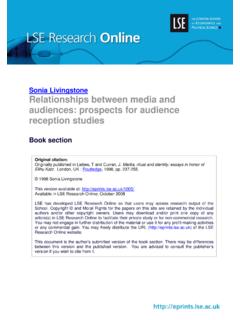Transcription of Liberalism and nationalism - London School of Economics
1 Kelly, Paul Liberalism and nationalism Book section Original citation: Kelly, Paul (2015) Liberalism and nationalism . In: Wall, Steven, (ed.) The Cambridge Companion to Liberalism . Cambridge Companions to Philosophy. Cambridge University Press, Cambridge, UK. ISBN 978110743941. 2015 Cambridge University Press This version available at: Available in LSE Research Online: March 2015. LSE has developed LSE Research Online so that users may access research output of the School . Copyright and Moral Rights for the papers on this site are retained by the individual authors and/or other copyright owners.
2 Users may download and/or print one copy of any article(s) in LSE Research Online to facilitate their private study or for non-commercial research. You may not engage in further distribution of the material or use it for any profit-making activities or any commercial gain. You may freely distribute the URL ( ) of the LSE. Research Online website. This document is the author's submitted version of the book section. There may be differences between this version and the published version. You are advised to consult the publisher's version if you wish to cite from it.
3 Liberalism and nationalism Paul Kelly Liberalism and nationalism are two distinct ideologies that emerged in Europe following the French Revolution, although both have deeper roots in European intellectual history. These ideologies continue to characterize and shape political developments into the twenty-first century and remain a concern of contemporary liberal political theorists such as Hayek, Berlin, Rawls, Taylor Miller and Tamir who wrestle with the extent to which they are complimentary or antithetical.
4 There have certainly been liberal philosophers in the twentieth century who have seen nationalism as one of the most potent threats to Liberalism . Yet there have been self-proclaimed liberal nationalists, and some of the most important figures of nineteenth and twentieth century European Liberalism such as John Stuart Mill, Max Weber and Isaiah Berlin have been sympathetic to the importance of national identity. There have also been national-liberal political parties in western democracies. This essay will explore the diverse responses to national claims within the liberal tradition and the extent to which these two perspectives can be reconciled.
5 The history of Liberalism and liberal ideas and the history of nationalism provide ample opportunities to confuse and conflate any exclusive definition of 1. each complex tradition or theory. Nevertheless, one can profit by using John Breuilly's characterization of nationalism as involving three distinct positions;. that nations as groups exist; that they have value to their members and in themselves and that because of this value they have a claim to some form of political A definition of Liberalism is equally controversial but using the structure of Breuilly's analysis whilst replacing nation with individual, to characterize Liberalism is instructive.
6 Although liberal theorists differ over how far Liberalism is fundamentally a social theory or a substantive ethical and political philosophy both positions acknowledge that it is individualist: that it regards individuals as real; as having fundamental value and in consequence that individuals have a claim to moral and political self-determination usually characterized in terms of rights to freedom and equality. The debate about the compatibility of Liberalism and nationality has been at the heart of the philosophical disputes between individualists and communitarians and between cosmopolitanism and particularism as approaches to political rights and values.
7 This essay will also address the extent to which these distinctions show that Liberalism and nationalism are antinomies or merely dichotomies of a larger whole. 2. To make sense of the recent debates between Liberalism and nationality it is necessary to explore the philosophical sources of Liberalism before its emergence as an ideology in the nineteenth century and then examine the way in which national identity is incorporated into the liberal political thought through the particular examples of John Stuart Mill2 and Lord Acton.
8 This history sets the context for Isaiah Berlin's3 rehabilitation of nationality within liberal theory and its use by contemporary liberal philosophers such as David Miller, Charles Taylor, Will Kymlicka and Yael Tamir who have sought to emphasize national identity against the perceived individualistic cosmopolitanism of John Rawls' A Theory of Justice. The paper will conclude by arguing that the Berlin inspired reconciliation of Liberalism and nationality is unsustainable and the Rawls's notion of a Law of Peoples4 provides a better account of the claims of political community with Liberalism than that of liberal nationalists without at the same time collapsing into an unrealistic form of cosmopolitanism.
9 Pre-national Liberalism As an ideology, Liberalism emerged in Europe in the wake of the French Revolution but as a philosophical approach to politics it originated in the 3. eighteenth century. It would be na ve and anachronistic to claim that Locke, Kant, Hume and Smith were liberals in any straightforward sense it is nevertheless possible to identify sources of Liberalism in the complex philosophies of each These four thinkers help to identify two distinct strands in the development of liberal thought that have a bearing on the way in which groups are accommodated within a liberal theory and importantly how the idea of nationality features within Liberalism .
10 It is worth bearing in mind that the modern concept of a nation was unavailable to all four thinkers. John Locke and Immanuel Kant are two familiar sources of Liberalism as an ethical or moralistic approach to politics and are used as ideal types by contemporary libertarian and egalitarian philosophers to explain and defend their respective theories of justice or individual rights. Both Locke and Kant distil and transform an earlier tradition of natural jurisprudence that sought to explain political authority and the claims of individuals in respect of it.









